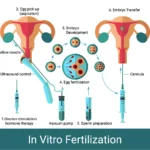Difficulty in conceiving is a common concern for couples in India today. Don’t let a string of negative pregnancy tests get you down! Just know that doctors recommend that young couples wait up to a year before undergoing medical testing and treatment.
Conception is a very tricky concept and only happens throughout the fertile window of a woman’s menstrual cycle. In fact, while it may seem like conception will never occur, it could happen even after having undergone treatment or trying naturally for up to one year.If this still isn’t successful, there may be some underlying health concerns that require to be addressed throughout medical testing and diagnostic process or added treatments such as nutritional support.
Some couples can have a hard time getting pregnant and in many cases the doctors are unable to determine the exact cause. It’s important not let between 15-25 years of age deter you from trying to conceive naturally.
Ideally, it’s recommended that wives should start trying when they are most likely to get pregnant – during their most fertile window, which is about 5 days every month! You may not become pregnant instantly, but know that it may take anytime for conception to happen.
If you do have a hard time getting pregnant with regular or natural even after one full cycle or 12 months has gone by, then don’t fret yet: you might want to see a specialist just to be sure that there aren’t any other factors playing into your situation!
At Matritava IVF Fertility, we appreciated the provocation faced by couples who are having trouble think up. That’s why we have assembled an internationally acclaimed fertility team to offer our patients cutting-edge technology, excellent guidance and holistic care. Pregnancy is our #1 goal, and we’re proud to present you with our most insightful blog post on fertility so far.
The Age Factor
You might be wondering about these irregular periods. If you are 35 years old or older and have had problem becoming pregnant or have tried to appreciate for more than 12 months, it may be time to talk to a fertility expert. Indian women begin aging rapidly by the age of 35, with egg production beginning to decline significantly by the fifth decade. By 40-45 years of age, all women practice menopause; this is when they stop having regular menstrual cycles and cannot get pregnant.
The Health Factor
There are some health conditions that have unfavorable impact on the fertility potential of women. Thyroid unrest in women can lead to physiological imbalances. Women who encounter from thyroid diseases are known to be pretentious with conditions like miscarriages, infertility, abnormalities in fetalmind development, etc.
However, if the thyroid disorder is recognized and the patient takes anesthetic, then the woman can think up through fertility treatment. One should also visit their doctor consistently during the treatment process as suggested by your doctor from Matritava Fertility Center.
Women with PCOS and endometriosis should consult with a fertility specialist if they’d like to get pregnant. These conditions cause an unhealthy resting environment inside the pelvic region that may contribute to damaged uterine tubes and weaker ovaries which can diminish chances of achieving pregnancy by all means other than via medical intervention.
Many women never know why theyaren’t getting expectanteven when they are testingto appreciate. A fertility specialist can help answer questions about the following possibilities: irregular periods, lumbar pain and infertility.
For women who have gone throughout multiple miscarriages and have not been intelligentto get pregnant in the past, it is usually advised that one should consult a fertility specialist right away because these problems might need medical intervention.
The Male Factor
When it approach to fertility in women, their ability to conceive is often challenged by issues pertaining to the male counterpart. Male factors are said to be related and found in 40%-45% of all infertility cases. For example, also known as OAT (obstruction-abnormal testicular) syndrome, varicocele represents an enlargement of blood vessels inside the sudden flank pain which occurs on both sides (left and right) and it’s when they happen outside the normal area that they become problematic because this is what prevents sperm from reaching their destination – i.e., a woman’s womb where she can conceive and carry a child (also known as pregnancy). It’s definitely something medical teams need to consider when conducting couples’ infertility evaluations.
Often the best person to see about this is a sexologist or a psychologist as they are best equipped to help alleviate these issues. If either you or your partner has an infection, it’s also very main that you see a doctor who will be able to authorize the accurate medicine for it so that these infections do not further reduce quality or quantity of sperms.
There are many various types of IVF treatments out there and if any of the above conditions affect you and/or your partner we recommend seeing one right away. While ICSI (intracytoplasmic sperm injection) is great at ensuring that quality sperm is used during the process, IVF (in vitro fertilization) often yields better results overall because it uses both partners’ eggs and sperms in combination with each other.
Infertility in men and women can happen for many reasons, so it’s wise not to take chances. Scientists are still trying to determine what causes this phenomenon, but age is a contributing element– so the sooner you see fertility specialists, the better!







